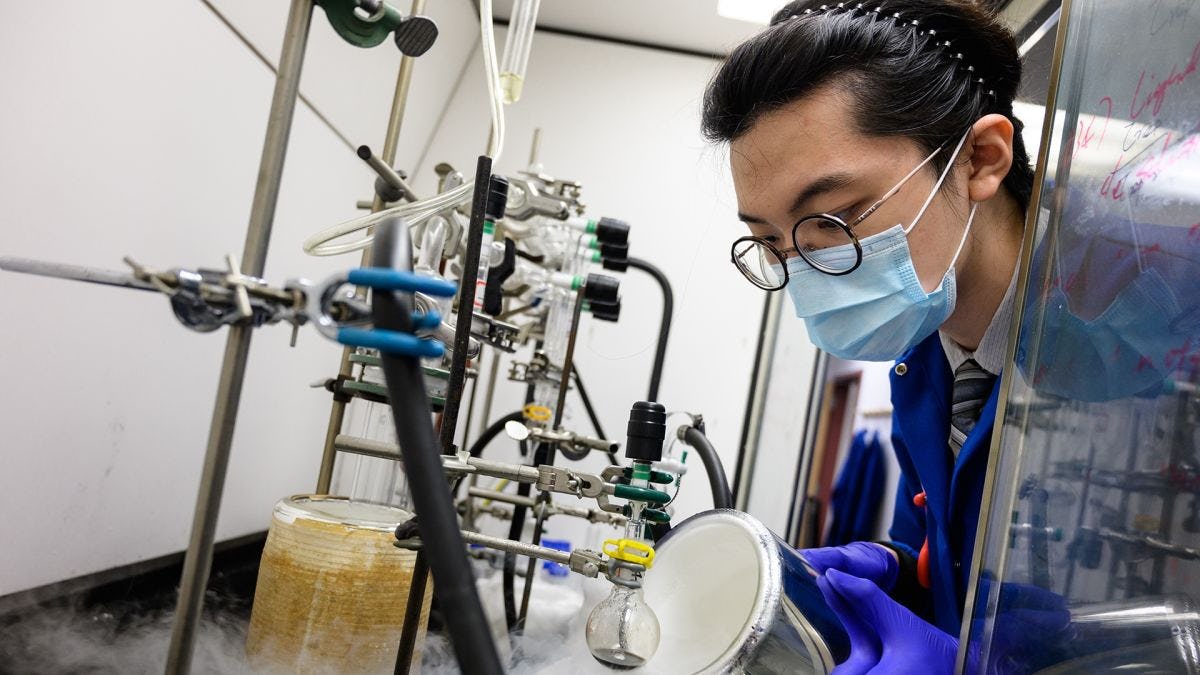
Bachelor’s Degree in Chemical Engineering
Program Details
Degree
Bachelor of EngineeringAvailable
On campusBecome one of tomorrow’s technological leaders in industrial chemical processes with a chemical engineering bachelor’s degree from Stevens.
The chemical engineering bachelor’s program educates you to become a future technological leader through in-depth training on conception, synthesis, design, testing, scale-up, operation, control and optimization of industrial chemical processes that impact our well-being.
The chemical engineering bachelor’s program provides a foundation in chemical engineering science and experimentation, the use of modern computational tools such as ASPEN software for the simulation of chemical reactors and separators, and design and research experience with a faculty member to prepare you for the chemical engineering practice. A specialized, eight-semester design sequence sets this program apart, culminating in the last three semesters with chemical engineering design projects which are both experimental and computational.
Concentrations
Biomolecular Engineering
Chemical Process Data Analytics
Energy and Sustainability
Materials
The Stevens Advantage: Hands-On Learning, Real World Experience
At Stevens, you’ll learn to think like an engineer. Our design-focused curriculum features a hands-on course every semester that will instill you with broad, foundational knowledge, the complete fundamentals of engineering, and entrepreneurial thinking. Learn more about what makes an engineering education from Stevens a unique experience:
The Design Spine: a unique, design-focused, hands-on course every semester that incorporates entrepreneurial thinking and experiential learning, culminating with Senior Design, a team capstone project working on prototypes for real business problems, potentially in collaboration with a real company
Innovation Expo: an exciting design and entrepreneurship competition where students showcase their senior design prototypes and pitch business ideas
Engineering Cooperative Education Program: nearly 30% of all engineering students participate in Stevens’ Cooperative Education Program where you get on-the-job experience working for real companies
State-of-the-Art Research Labs and Facilities: build, tinker and test your designs in Stevens' MakerCenter, Prototype and Object Fabrication Lab, or numerous other research facilities
Undergraduate Research Opportunities: our research-oriented curriculum gives you in-the-lab experience while you're still an undergraduate student
More opportunities for Stevens undergraduate students include:
Double count undergraduate course credits toward a graduate degree and earn your master's faster – in just five years through Stevens' Accelerated Master's Program >
See what it's like to be a chemical engineer at Stevens by visiting the links below.
An ABET Accredited Program
The Bachelor of Engineering in Chemical Engineering program is accredited by the Engineering Accreditation Commission of ABET, https://www.abet.org, under the commission’s General Criteria and the Program Criteria for Chemical, Biochemical, Biomolecular and Similarly Named Engineering Programs.
Mission
The mission of the chemical engineering program is to educate technological leaders by preparing them for the conception, synthesis, design, testing, scale-up, operation, control and optimization of industrial chemical processes that impact our well-being.
Program Educational Objectives
As the program educational objectives, graduates of the Stevens Bachelor of Engineering in Chemical Engineering are expected to:
Apply mathematics, science and maturity of experience to lead in the solution of complex problems in chemical engineering
Demonstrate broad-based skills and understanding of problem solving, ethics, social awareness, safety, communication, teamwork and leadership to excel as recognized leaders in their profession
To accomplish this, the undergraduate program provides a balanced education in fundamental principles, design methodologies, and practical experiences in chemical engineering, general engineering, and physical and mathematical sciences topics through which graduates can enter and sustain lifelong professional careers of engineering innovation and creativity.
Graduates of the chemical engineering program will:
Be recognized as innovative technical experts who demonstrate advanced understandings of the state-of-the-art in chemical engineering, as well as their professional, social, and ethical responsibilities
Emerge as technical leaders through their own individual contributions and their abilities to work with and influence others
Function as effective entrepreneurs who nurture innovative technologies from concept to commercialization
Qualified undergraduates may work with faculty on research projects. Many of our graduates pursue advanced study in chemical engineering, bioengineering or biomedical engineering, medicine, law, and many other fields.
Student Outcomes
By the time of graduation, chemical engineering students will have:
An ability to identify, formulate, and solve complex engineering problems by applying principles of engineering, science, and mathematics
An ability to apply engineering design to produce solutions that meet specified needs with consideration of public health, safety, and welfare, as well as global, cultural, social, environmental, and economic factors
An ability to communicate effectively with a range of audiences
An ability to recognize ethical and professional responsibilities in engineering situations and make informed judgments, which must consider the impact of engineering solutions in global, economic, environmental, and societal contexts
An ability to function effectively on a team whose members together provide leadership, create a collaborative and inclusive environment, establish goals, plan tasks, and meet objectives
An ability to develop and conduct appropriate experimentation, analyze and interpret data, and use engineering judgment to draw conclusions
An ability to acquire and apply new knowledge as needed, using appropriate learning strategies
A fundamental knowledge and an appreciation of the technology and business processes necessary to nurture new technologies from concept to commercialization
Putting You on Track for Professional Success
The chemical engineering bachelor’s program develops in-demand knowledge and skills to put you on track for career success. Upon graduation, many of our graduates pursue advanced study in chemical engineering, bioengineering or biomedical engineering, medicine, law, and many other fields. Career opportunities include:
Process Engineer
Product Engineer
Design Engineer
Research Engineer
Potential hiring organizations include companies like: ExxonMobil, British Petroleum (BP), Shell, Merck, Pfizer, Bristol-Myers Squibb, PepsiCo, Budweiser, L’Oreal, Proctor-Gamble, Dow, Dupont
A Tech Forward Education
Undergraduate Programs Facts & Statistics
Related Programs
Bachelor's Degree in Chemistry
Research with some of industry’s brightest minds as you prepare for a career in one of the most applicable fields of science.
Bachelor's Degree in Chemical Biology
Learn how biological systems operate and how to engineer changes in those systems at the university that was a pioneer in the field of chemical biology.







